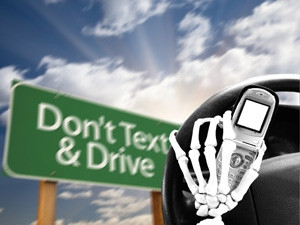
Even though the perils of texting while driving have been expounded at length by road safety groups, authorities and even mobile phone companies, numbers of motorists who still employ this dangerous behaviour do not seem to be dropping.
Now, several parties are looking at different ways technology can be employed to mitigate the frequency and associated risk of driving and texting - a behaviour that has been proven to be more dangerous on the road than drunk-driving.
New exploratory research by King's College, in Pennsylvania, in the US, shows that - despite being fully aware of the dangers associated with texting and driving - four out of five college students still do it. Males, say authors of the study Garold Lantz and Sandra Loeb, widely agree that texting while driving is dangerous, but believe they are better at doing so than their female counterparts.
This comes five months after a study by New York-based Cohen Children's Medical Centre revealed texting while driving surpassed drunk driving as the number one cause of death among teenagers behind the wheel in the US, for the first time.
South Africans are no different, say industry players.
Targeted tech
Oscar Ruiz, partner and head of AT Kearney's communications, media and technology practice in Africa, says communications technology has a key role to play in ensuring risks while driving are minimised.
He points out that "driving and communicating" involves the participation of many parties - from mobile operators, car manufacturers, insurance companies, banks that finance the cars and the police - to the end-user and other drivers on the road.
"All parties have a genuine interest in safety. However, mobile operators and insurance companies could leverage existing platforms to quickly impact 'driving and texting' safety beyond awareness campaigns."
Ruiz says voice-driven messaging applications already exist and more sophisticated ones are in mobile players' pipelines. Telematics in the car are already provided by insurance companies to track drivers' behaviour and offer more targeted pricing, as well as value-added services: if you drive and text, your insurance premium could go up significantly, or an alert could be sent to your managing centre if you are part of a fleet. Telematics are also contributing to saving lives by automatically requesting immediate assistance in case of a crash."
Vodacom, SA's largest mobile network by customer numbers, sees the safety of cellphone users on the road as one of its responsibilities. Spokesperson Richard Boorman says the company is working on putting together a new campaign in this regard.
Road safety apps
"We've found that just highlighting the dangers doesn't appear to work, so we're also looking at how we can employ technology to make the campaign more effective. There are various apps that we're looking at to see what we might be able to apply in the South African market," says Boorman.
Ruiz points to some of the apps that are being used abroad:
* ORIGOSafe requires the phone to be docked before the vehicle starts, and sounds an alarm if the phone is removed while driving.
* Android app urTXT? soon to be released for iPhone - sends a standard text telling the sender that the recipient is driving.
* AT&T DriveMode automatically sends a customisable auto-reply in response to incoming text messages when the vehicle is moving above 40km/h. The message lets friends know that you are currently behind the wheel and will reply when it is safe to do so.
* Verizon Safely Go also responds to messages for the driver, allowing him/her to keep concentration on the road.
Boorman says Vodacom believes social media also has a role to play in keeping cellphone users out of danger on the road. "We're looking to facilitate a conversation via social media so that people hear it from their friends and family that texting and driving simply isn't acceptable." He says the social media approach is apt to be "far more effective than a company preaching on the topic".
Executive head of communications at Cell C, Karin Fourie, says - while the company would always support efforts and policies aimed at promoting responsible behaviour amongst its customers - it does not have a specific product that deters drivers from driving and texting. "However, most of the current smartphones have applications that can read out an SMS while driving instead of reading. There are also applications that have a voice functionality that can record voice clips which can be broadcast to a selected group of recipients instead of texting while driving."
Ruiz says, in coming years, technological innovation will reshape the industry with a "boom" in connected cars globally.
"Mobile players are already seeing the value of more advanced telematics in the car, and as such they are starting to move. Verizon has acquired Hughes Telematics for $612 million cash, to secure telematics business with original equipment manufacturers like Daimler AG's Mercedes-Benz and Volkswagen ? among other opportunities."
He says mobile players and insurance companies will most likely be at the centre of the space - and new players will join them. "I am confident that the new ecosystem will deliver significant value to the end-user and help close any remaining safety gap."
Share